Exterior wall paint What paint to chose for wall painting
Exterior wall paint What paint to chose for wall painting
The complete guide – article by: Dr. Belen Evgenia
Water-based acrylic paints and turpentine-based acrylic paints – the best of them will win for painting exterior walls.
Once every few years, every 5 years or so, after the rainy winter with its damage to the paint, and especially in the spring or early summer, the need to renew and refresh the appearance of the exterior walls of the house, which are fading, cracking, peeling, arises again and again.
The question is which color is chosen? What is the most suitable? With which one will we paint so that it lasts longer, which one is more durable? More washable? Will it be sealed from the passage of rain? isolated? Will it prevent condensation and mold? What exterior color was chosen? Turpentine base or water base? Maybe we’ll go for a colored schlicht? What about choosing shades to our taste? How do we choose them? And in general, how do you approach the operation? How do you prepare the house for painting? What colors do you choose? How do you paint?
We will discuss here, the significant difference, between exterior paints familiar to all of us: acrylic water colors, such as Danberacryl 3000 or Danberacryl 4000 , to acrylic solvent paints of the type Danbartex Super and Danbartex Primer .
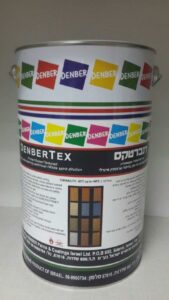
Denbertex primer white primer for exterior walls Denver Colors www.denber.net
Water-based acrylic paints and turpentine-based acrylic paints – the best of them will win for painting exterior walls.
Well, the biggest and most important difference of all, is the huge difference in the weathering time of these exterior paints . Acrylic watercolors are durable for about 5 years in total. After 5 years in direct sun and rains every year. These colors almost completely lose their excellent properties. which they had at the beginning of their journey: flexibility, adhesion (ability to stick to the infrastructure). In contrast, acrylic solvent paints such as Denbartex Super are durable for at least 25 years under the same conditions. See one of the letters of thanks and appreciation:


Therefore, the first recommendation: if you are already painting the exterior walls of the house – let’s paint with Denbartex.
- Preparing the house for painting : garden furniture should be moved away from the walls, plants should be wrapped in plastic and tilted away from the wall. Cover the floor next to the wall with plastic or paper for a distance of at least 2.5 meters, attach with adhesive paper. Cover with adhesive tape and nylon – window and door frames, as well as the windows and doors, laundry baskets, air conditioners, pipes, gutters, outdoor lighting, security cameras, etc.
- Preparing the walls for painting: removing loose paint by scraping and polishing, high-pressure washing to remove all dust and dirt, treatment of capillary cracks – widening and deepening, applying a layer of polyplex primer in the cracks, and applying a suitable exterior putty of the Denver flexible acrylic type , for structural cracks larger than 3 mm we use gum Polyplex flexible polyurethane gum in a 600 gram sausage, deepen and widen the crack, clean dust, apply Denbartex primer inside, we will wait 24 hours for drying, fill with polyplex gum and attach a bandage to the surface of the crack to prevent the crack from reopening. Preparing the walls is one of the most important steps in the work process. Therefore, proper preparation of the walls will form a solid foundation for paint or coating. These will last for years longer. will lead not only to a better result but also to much less hard cleaning work at the end of the job. Improper preparation of the walls will later cause cracks in the paint and peeling, and this in a relatively short time.
Water-based acrylic paints and turpentine-based acrylic paints – the best of them will win for painting exterior walls.
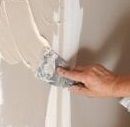
Putty walls Denver putty Denver colors www.denber.net
3. Painting exterior walls: after finishing preparing the walls for painting, apply a layer of primer. Using a Denbartex Primer type foundation creates the strongest foundation layer in the category of exterior wall primers and in addition it is a sealing paint that knows how to penetrate capillary cracks to fill them and prevent the passage of rainwater. You can use primers for exterior walls for less stringent durability requirements such as water- based Danbrol Super . But as with any structure, the elements of the structure are of primary importance, so is the color. The importance of the correct foundation exceeds the importance of the paint or top coating, which can be renewed relatively easily.
Below are 4 options for the final layer:
- Dunbarcryl 4000 paint – smooth, washable acrylic paint with a standard grade, for diluting with water, resistant to outdoor conditions. Produced in a variety of shades from every catalog of every company. Easy to apply, odorless, resistant to weather conditions for at least 5 years.
- Denbartex Super paint – solvent acrylic smooth paint to be diluted with turpentine, flexible, excellent resistance in outdoor conditions, produced in many shades, from every catalog, weathering of at least 25 years.
- Smooth or granular superplex flexible wall coating, water-based acrylic. Bridges existing cracks and those that will develop in the future.
- Colored Schlicht coating – decorative flexible coating in many shades and several textures from fine to coarse. Very popular in recent years. It is recommended that when the coating is finished and after it has dried, apply siloxane 290 to seal and prevent the ingress of rainwater that damages the coating, causing it to disintegrate and the passage of rainwater through it.
Water-based acrylic paints and turpentine-based acrylic paints – the best of them will win for painting exterior walls.
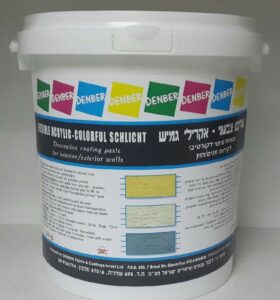
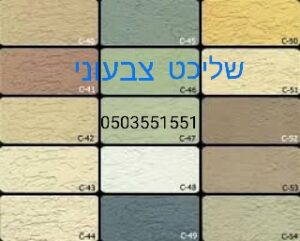
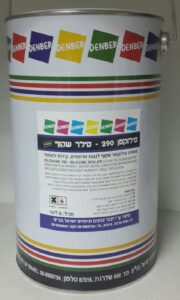 4. External walls in buildings near the sea: buildings near the sea suffer from severe corrosion from the salty atmosphere of the sea water. In these buildings you can see rusting of the rebar causing it to swell and crack and break and disintegrate the concrete. Therefore, in the first step, concrete restoration must be carried out. Exposed iron, carve up to 5 cm of rust-free iron in the concrete on each side, polish the iron well, apply a base layer of rust-converting epoxy epoxy, a protective barrier layer with aluminum sulcot epoxy , locally close small parts with putty epoxy and parts large for plastering and leveling the wall/column. At the end of curing for about 28 days, if cement plastering was performed, apply Epoxy Fluor Primer , a transparent penetrating primer that penetrates the infrastructure, creates “roots” and strengthens the infrastructure. Cracks must be widened and filled with polyplex mastic. The final layer for these buildings is Dunbargloss acrylic , a paint that has withstood the extreme salinity of seawater for decades.
4. External walls in buildings near the sea: buildings near the sea suffer from severe corrosion from the salty atmosphere of the sea water. In these buildings you can see rusting of the rebar causing it to swell and crack and break and disintegrate the concrete. Therefore, in the first step, concrete restoration must be carried out. Exposed iron, carve up to 5 cm of rust-free iron in the concrete on each side, polish the iron well, apply a base layer of rust-converting epoxy epoxy, a protective barrier layer with aluminum sulcot epoxy , locally close small parts with putty epoxy and parts large for plastering and leveling the wall/column. At the end of curing for about 28 days, if cement plastering was performed, apply Epoxy Fluor Primer , a transparent penetrating primer that penetrates the infrastructure, creates “roots” and strengthens the infrastructure. Cracks must be widened and filled with polyplex mastic. The final layer for these buildings is Dunbargloss acrylic , a paint that has withstood the extreme salinity of seawater for decades.
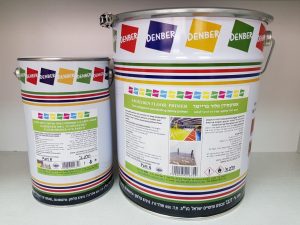
Epoxy Epoxyden Floor Primer Penetrating www.denber.net
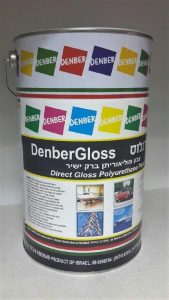
Denbergloss acrylic glaze paint for exterior walls www.denber.net

 English
English עברית
עברית Русский
Русский